OUR TRAINING GOAL IS EXCELLENCE, WHAT'S YOURS?
'Every little thing matters' - remember that and it will help enormously with your training. If you don't know what that means, you need to learn. It is the difference between an 'ok' dog and an 'excellent' dog
Love, calmness, consistency, praise and attentive training are what makes the difference between a happy, trained dog who keeps his personality and who works with you because he wants to and a dog who works for you out of fear. Don't get frustrated and start shouting and tearing your hair out.
It isn't unknown for people to spend a whole 1hour lesson with us and not being allowed to talk to or whistle the dog in order to learn how to communicate with him without loudness, constant chatter or shouting. Get the help you need.
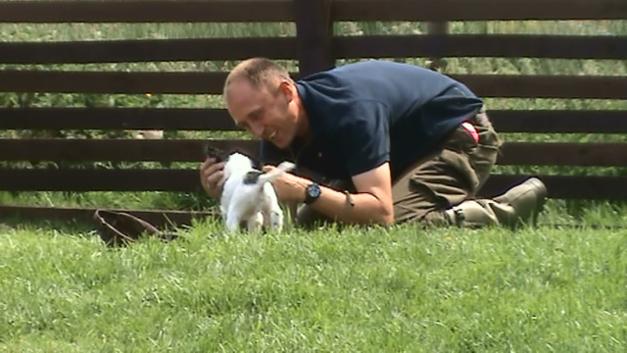
When you get your new pup home immediately begin the bonding process. Play with your dog, become his best friend, his leader, protector and become the person he always wants to be with. And when you begin training, keep that in mind, that you always want to be the person he wants to be with. You need to become and stay the most important and interesting thing in his whole life. The best way to keep that bond with your dog is through continual training. Dogs don't see training as 'training', they see it as fun time with their favourite person, and the better you do it, the more they enjoy it!
If I believe in anything in life, it is this:
Owning a dog means more than just feeding them, taking them to the vets when needed and taking them for walks. Dog training is more than just sit, stay, fetch and heel. A dog is not a disposable or replaceable item like a car or tv. You can't turn them on and off as you would your laptop or radio. They are not only expensive to keep well and happy but they have a brain which they can use and they have emotions. Like children, they need more than just a roof over their head and food in their belly. Never underestimate the instinct, intelligence or feelings of a dog, to do so would make you a fool.
If you own a dog and you want it to be not only happy, but well balanced, mentally and emotionally, you need time, energy and commitment and if you have passion too, then your relationship with your dog will also come on leaps and bounds. Dogs need to use their brain. If you don't give them tasks to use their brain, they will find tasks of their own to use it. The more you train your dog, the more your dog will want to train. Training does not need to be a regimented, formal and boring process you feel you have to go through, if that is how it feels, then both you and your dog will fail. Training does need to be consistent, clear, timely, interesting and challenging (too challenging and they will fail, not challenging enough and they will be bored so wont focus). By challenging I mean mentally. Most dogs can cope with any physical challenge we throw at them but mental challenges are a different ball game and give dogs a totally different kind of enjoyment. Dogs need us to interact with them in an interesting way but not in a way that can create manic behaviour e.g. repetitive ball throwing, or boredom.
How to Train Your Dog
People phone and say 'I have a young dog, my friend said to do this, my other friend said do that, so what should I be doing?'
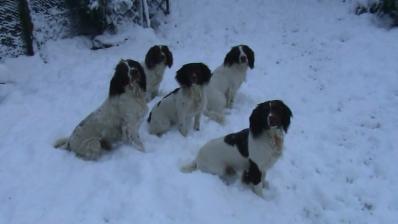
So I tell them the same thing, one of them being, don’t rush the dog, don’t put an old head onto young shoulders. I’m sure some of them think, ‘what is she talking about’? I give them other advice too, even suggesting they come for the assessment session, to make sure they start the dogs training off right, which will not only save them money in the long run but it will save them time, save them needless frustration and save the dog from never ending yelling’s in the future.
They sit on the other end of the phone, they hear the words, those simple words and yet, I may as well be speaking in an alien language. What happens? Fortunately, some people do listen, and get it right, those that don’t, turn up at the door 6 months later with a list of problems that are going to take forever and a day to now fix and they have this nagging headache to boot! Or even worse and most worrying, they have been going to a trainer and now have new or even more problems!
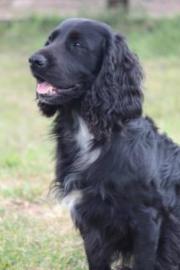
Why do people have to rush the dog? Why do so many dogs not get to live the actual puppy stages? I think this is partly because life is so fast paced now for so many of us and also, that people are just so keen to get cracking with the training they actually forget about the dog!
If they don’t believe me then they should believe the Great Gundog Training icons, read any book by the likes of Joe Irving or Keith Erlandson, they will tell you the same thing, let the pup be a pup, there is plenty of time to start the serious training.
Just because a 10 year old child can understand English and can read and write, you wouldn't expect them to go out to work, 9 to 5 job and be mentally mature enough to deal with the office politics, deadlines and endless other scenarios they would encounter, so why would you expect a young dog to? Don't deprive them of their puppyhood, it doesn't matter how clever you think they are or how good they are at doing things a 2 year old dog can do. Is it really fair to ask them to do that?
I just can’t say it enough. Let the pup be a pup. You have to bond with your dog and begin training with play-training, it is as simple as that. Don’t try to turn the play-training stage into serious training. Keep it gentle, happy, light, little retrieves with rolled up socks, don’t take the retrieve straight from the pup when it comes back. Treat your pup as an individual, yes it is a dog, but it’s not the same as your neighbours dog, or your friend’s dog, it is an individual. There are lots of little things that you can do during the play-training stage to prepare the dog for the proper training.
So When Do You Start Proper Training?
LET THE PUP BE A PUP but do not interpret that to mean NO TRAINING. Puppy play training is probably one of the most important parts of your dogs training programme. Do not let your dog get to 1 year old and turn around and say you have let your pup be a pup and that you haven't even started sit, stay, retrieve and recall. If you do that you are asking for trouble. This is fine for very experienced handlers who know how to train just about any dog. But for the average dog and gundog owner, not doing those basics early on will lead you to a road of headaches.
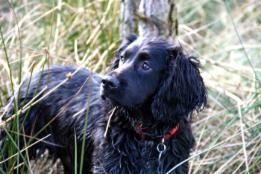
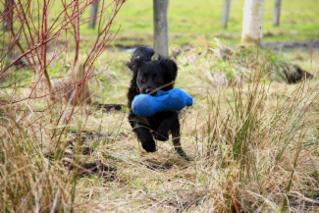
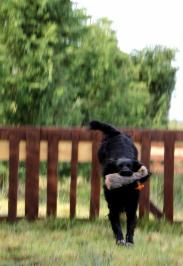
And no, I am not advocating religious sit, stay, heel. I am advocating puppy play training which means, as the pup is growing through it's puppyhood, it should be starting to learn these basics in a fun and interesting way. If you try to do these basics too early and in a very strict manner, you may well break that poor pups spirit. It is hard, I know, to find the right balance between puppy play training and training proper. To keep it light enough so that they keep their interest but consistent and concise enough for them to actually learn. There is a balance you need to find to get it right. It is the same with the retrieving aspect, for both those wanting their dogs to work and for the dogs who are pets (especially if they have come from working stock). With Spaniels in particular, you need to start that retrieving off very early, how early...?.....from the day you bring that pup home. No, you don't get that puppy dummy straight out from day one and say fetch. You get soft and light items, like a single old sock, and snake it about on the floor to get the puppy interested first, if you do put it out a little way from you and your pup jumps to get it great, but do not go and then take that sock straight out of his mouth. Praise the pup, keep the pup close to you and stroke the pup telling him how clever he is. And only after that, you can very gently, remove the sock from the pups mouth
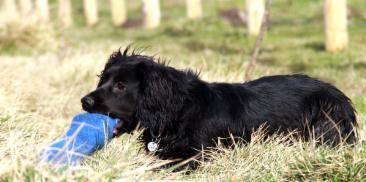
And even here you can get it wrong. Do too much of this, for too long over the coming months and things can go wrong. Like what......... you can totally sicken the dog so he loses interest in retrieving, you can use the wrong toy/dummy, etc. for too long and they can sometimes struggle to progress onto other items, getting into tug of wars is a complete 'no no', taking the retrieve straight from the dog can teach the dog to run rings around you rather than deliver (because you're only going to steal his trophy), not enough can leave the hunting dog with an over active hunting instinct and not enough retrieving instinct, and more.... So what do you do, well, you read your dog, not the dog in the book or on the dvd or your friends dog, you read your dog.
If one thing doesn't work, change it. Improvisation is a great tool in dog training. Reading your dog is also a great tool in dog training. But for the average dog owner, bonding is your best tool for dog training. There are so many ways you can do this, but what you are trying to achieve is your dog keeping an eye on you and not the other way around, the dog wanting to be with you and please you, because this brings its own rewards for him. And never never give a command OF ANY KIND that you do not intent to follow through. And if you do give a command, always place yourself and your dog in the best possible position and/or situation for your dog to get it right.
Class/Group Obedience Training also, too early, can be detrimental, especially to the Spaniels! Many people are worried about having the Spaniel obedient very early on as they can have a reputation to be unruly, mad and difficult to train so people try to keep them so far in and so obedient from day one, that the Spaniel then loses it's edge.
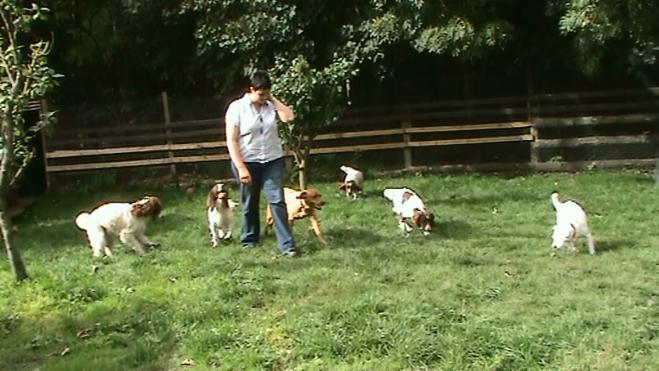
The Spaniel is not a Labrador. It's job is not to sit stuck to your heel and look pretty and go off to only retrieve (meant in the nicest possible way to the Labrador owners). The Spaniel is designed to get on with it, get in it, regardless, and to do it with enthusiasm, style, vigour and energy. Too much obedience training too early can break this spirit, especially with the softer Spaniel which is seen more and more these days.
Training is serious but that doesn't mean it can't be fun for both dog and handler. If the dog doesn't find your training fun, interesting, challenging and leaving it wanting more, then you are doing something wrong. If you have been doing the wrong thing for too long, it may be too late to cure.
All of our training is based on positive reinforcement, basically, praise and reward. We have no time for belting, booting or throwing. There is no reason in the world why someone should stand on a dogs back to teach it how to stay or any other such nonsense. This is the wrong way to train a dog, in fact, it isn't training, it's bullying and frightening! We aim for happy trained dogs, not those that cower behind your leg too terrified to even think about putting their nose beside your leg. Our training is very much about bonding, praise and reward, positive dog training.
The harshest form of punishment your dog should ever get (if reprimand or punishment is needed), is a firm voice, a certain body stance, and a look in your eye. It's not about shouting, it's about 'tone'. But reprimand and punishment needs to be balanced with praise and reward, or it is worthless to the dog. You also need to be able to read your dogs body language and your timing for everything is crucial to getting the results you want from your dog.
Many dogs are labelled wild and unruly, and many of them are exactly that. Some of these same dogs are also labelled stupid, most are not. Most of these dogs are wild and unruly and are seen as stupid because in actual fact they are intelligent and lack mental stimulation, from their owner, so they go off and find it for themselves, making them behave wild and unruly. This is why training is so important, not just because you want a dog that conforms to our society, but because you want your dog to get as much pleasure from life as it can so it is happy and content at the end of the day. Physical exercise alone is not enough.
If you don't insist on 'basic manners', e.g waiting to get out of the car until told, not barging out the back door at home as soon as you open it, letting them charge off as soon as the lead is removed, etc., you will never have a trained gundog, (or trained pet) no matter how much residential training you send him for or how many lessons you have. Always aim for the best your dog is capable of (no matter how small the task) and you will have so many more rewards, as will he.
If you are thinking about sending your dog for Residential Training, please read our 'Misconceptions' and 'Training Problems' pages so you can be sure you have a good understanding of what training is all about. It is not possible for anyone to make an informed decision without having all the facts and information available to them.
We love helping owners to train their dogs but you must understand that training is a long term plan and you, the owners, must have input into it for it to be successful.
Why One to One Training?
Because when you think you have a problem, very often, what you actually see is the side effect of a problem, not, the problem.
When people phone, they tell you the problem and you advise them the best you can. But this is generalist advice. Very often people phone because they have a problem, but often, what they see as the problem is actually a side effect of the real problem. Every dog is an individual. You need to see the dog and handler together to actually see what is happening (or not) and very often, once you tell the handler and explain, there you have it, the ‘light-bulb’ moment.
Without actually seeing dog and handler together, it is very difficult to be sure you are giving the right advice for that particular dog and handler.
Don’t get it wrong in those early stages, it isn’t fair on the dog. This dog is reliant on you getting it right, keeping it safe, giving it the best possible chance to be the best gundog it can be. Don’t let it down.
If you don’t do it the right way from the start, you are going to live to regret it somewhere along the line, it’s as simple as that. There is a wealth of training information within these pages, but remember, every dog is an individual, tailor your training to your dog if you want to get it right.
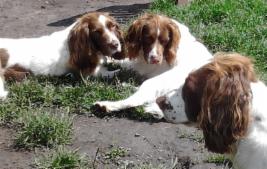
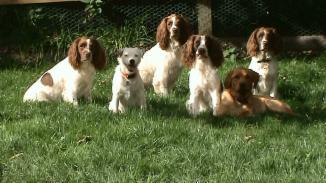
Gundog training starts with play training and bonding. The young dog then progresses onto puppy dummies. From here, more dummies are introduced with varying weights, shapes and textures. Hunting and seen and blind retrieves are developed and the starting pistol is introduced (at a very safe distance from the dog and coming in closer, never worrying the dog). Next, the launcher can be introduced and then progress onto the use of 2 remote launchers (this really puts the pressure on your dogs obedience in many aspects). Once your dog shows he is happy with fur and feather, cold game is introduced. All the way through these stages, your dog should not be moved onto the next stage until he is at an excellent standard on the current stage. While your dog progresses through his stages, obstacles like stone walls, water and fences are introduced as is training in rougher cover, woodland, open areas. This all takes several months, not a few weeks. Our training grounds offer varied cover for the gundog from water, woodland, heather, bramble, rhododendron, reeds and rushes.
The dog has to trust in us, in our understanding of it, as an individual. If it can't trust in us, the owner, the protector, who can it trust in?
There are going to be times out in the field when you are going to know better than the dog. Your dog is going to have to trust you enough to believe you over it's own nose. It is going to have to trust that you are directing it away from where it is certain the game is, to where you believe the game to be. If your dog doesn't trust you, it wont believe you and will therefore ignore you. This means that not only may you lose that runner, your dog may be putting itself in serious danger.
OUR TRAINING GOAL IS EXCELLENCE, WHAT'S YOURS?